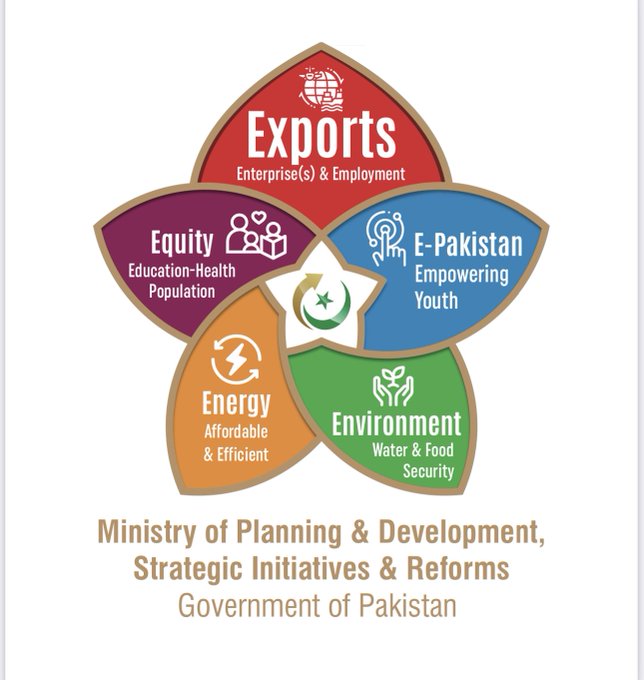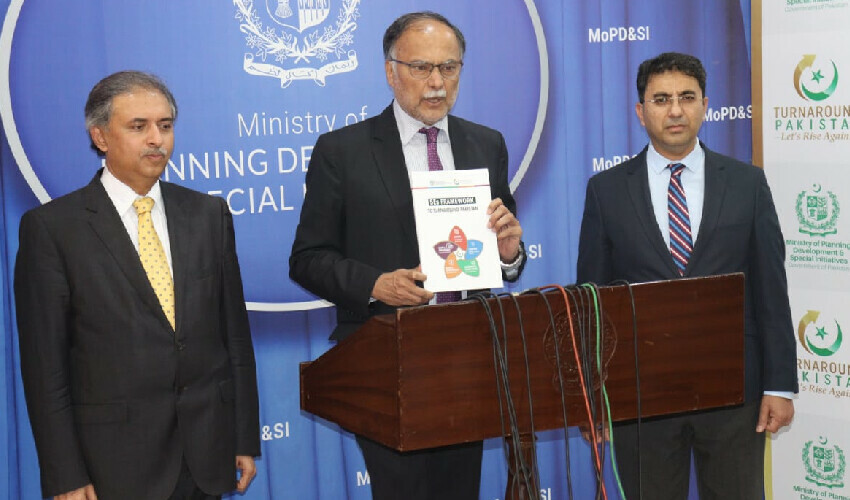The Pakistani government, led by Minister Ahsan Iqbal, has unveiled an ambitious plan called the 5Es Framework aimed at propelling the country’s economic development to new heights. This comprehensive strategy consists of five pillars that tackle crucial challenges and hold the potential to transform Pakistan’s economy.
The first pillar of the framework focuses on export-led growth, which Minister Iqbal highlighted as a crucial factor in stabilizing the economy and breaking free from cycles of economic volatility. To achieve this, the government aims to promote industries, agriculture, information technology, mining, and manpower sectors. By fostering enterprise development and generating employment opportunities, the goal is to significantly increase exports and establish Pakistan as an export-led economy.
The second pillar, known as “E-Pakistan,” centers around building a knowledge-based economy. Minister Iqbal expressed his vision to leverage the vast potential of IT and Telecom exports, which would serve as the foundation for driving socio-economic growth in the country. To achieve this, the government plans to accelerate the digitization ecosystem and expand the IT sector, creating a conducive environment for innovation, research, and development.
Recognizing the pressing issue of climate change and its impact on Pakistan, the third pillar of the 5Es Framework focuses on addressing environmental concerns, particularly water and food security. Pakistan’s vulnerability to climate change necessitates a proactive approach. The framework emphasizes the implementation of institutional, legal, and policy objectives to mitigate the adverse effects of climate change. By ensuring sustainability and resilience, the government aims to tackle the challenges of water scarcity and food security, safeguarding the nation’s future.

The fourth pillar is dedicated to energy and infrastructure. Minister Iqbal emphasized the government’s commitment to providing secure, sustainable, and affordable energy to all sectors, including industry and development. To achieve this, the government plans to diversify the energy mix by investing in renewable energy sources such as wind, solar, and hydro power. Additionally, energy efficiency and conservation measures will be implemented to reduce consumption, cut costs, and promote environmental sustainability.
The fifth and final pillar of the 5Es Framework is Equity and Empowerment. The government aims to foster inclusive economic growth, ensuring that no citizen is left behind. This pillar calls for a strategic blend of universal policies, affirmative action, and targeted interventions to provide accessible and high-quality health, education, and social protection services for all. The government will place special emphasis on empowering youth, women, persons with disabilities, and the least-developed regions of the country, thereby creating a more equitable society.
Read More: PAFLA urges Government to relieve Tax Burden on Freelancers
To ensure the effective implementation and progress tracking of the 5Es Framework, the Ministry of Planning and Development, in collaboration with federal ministries, provincial governments, and other stakeholders, will work diligently. Regular monitoring will be conducted to measure the success of policies, development projects, and initiatives aligned with the comprehensive strategy.
Minister Ahsan Iqbal concluded the press conference by proclaiming the launch of the 5Es Framework as a remarkable milestone in Pakistan’s journey towards sustainable economic growth and development. This transformative strategy sets the stage for addressing key challenges, seizing opportunities, and benefiting the nation and its citizens. With its focus on export-led growth, a knowledge economy, climate change mitigation, energy and infrastructure development, and equity and empowerment, the 5Es Framework promises a brighter future for Pakistan. By implementing these pillars, Pakistan is positioning itself for long-term economic prosperity and societal well-being.



